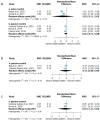Effect of Different Dietary Patterns on Patients with Depressive Disorders: A Systematic Review and Meta-Analysis of Randomized Controlled Trials
- PMID: 39940421
- PMCID: PMC11820241
- DOI: 10.3390/nu17030563
Effect of Different Dietary Patterns on Patients with Depressive Disorders: A Systematic Review and Meta-Analysis of Randomized Controlled Trials
Abstract
Objectives: This study aimed to investigate the effects of different dietary patterns on depressive disorders. Methods: PubMed/MEDLINE, Cochrane CENTRAL, Embase, PsycINFO, Scopus, and ProQuest databases were systematically searched until 30 April 2024 for randomized controlled trials (RCTs) assessing the effects of different dietary patterns on depressive symptoms in adults with depressive disorders. Secondary outcomes included remission rates, quality of life, and safety. Standardized mean difference (SMD) and 95% confidence intervals (CIs) were aggregated using a random-effects model. Study quality was assessed with the Cochrane Risk of Bias (RoB)-2 tool, and certainty of evidence was determined using the Grading of Recommendations, Assessment, Development, and Evaluation (GRADE) approach. Results: Five RCTs (n = 952) were included, all investigating the Mediterranean diet (MD) in individuals with major depressive disorder or elevated depression levels. The analysis found no significant effect of short-term MD intervention on depression severity compared to active (SMD = -1.25 [95% CI: -5.11 to 2.61]) or passive (SMD = -0.22 [95% CI: -0.74 to 0.29]) controls. There was no effect on quality of life compared to active controls (SMD = 0.71 [95% CI = -3.38 to 4.79]). Intermediate and long-term results were similar. The overall risk of bias was "some concerns", and the certainty of evidence was "very low" for most of the results. Conclusions: The MD appears to have no potential influence on major depressive disorder. However, this finding should be interpreted cautiously due to the limited number of RCTs. Further studies on dietary patterns and depressive disorders are needed for more robust conclusions. Systematic Review Registration: PROSPERO registration no. CRD42024541885.
Keywords: clinical trials; depressive disorder; diet; dietary patterns; meta-analysis; systematic reviews.
Conflict of interest statement
The authors declare no conflict of interest.
Figures




References
-
- GBD 2019 Mental Disorders Collaborators Global, regional, and national burden of 12 mental disorders in 204 countries and territories, 1990–2019: A systematic analysis for the Global Burden of Disease Study 2019. Lancet Psychiatry. 2022;9:137–150. doi: 10.1016/S2215-0366(21)00395-3. - DOI - PMC - PubMed
-
- Cipriani A., Furukawa T.A., Salanti G., Chaimani A., Atkinson L.Z., Ogawa Y., Leucht S., Ruhe H.G., Turner E.H., Higgins J.P. Comparative efficacy and acceptability of 21 antidepressant drugs for the acute treatment of adults with major depressive disorder: A systematic review and network meta-analysis. Lancet. 2018;391:1357–1366. doi: 10.1016/S0140-6736(17)32802-7. - DOI - PMC - PubMed
-
- Cuijpers P., Quero S., Noma H., Ciharova M., Miguel C., Karyotaki E., Cipriani A., Cristea I.A., Furukawa T.A. Psychotherapies for depression: A network meta-analysis covering efficacy, acceptability and long-term outcomes of all main treatment types. World Psychiatry. 2021;20:283–293. doi: 10.1002/wps.20860. - DOI - PMC - PubMed
Publication types
MeSH terms
Grants and funding
LinkOut - more resources
Full Text Sources
Medical
Miscellaneous

